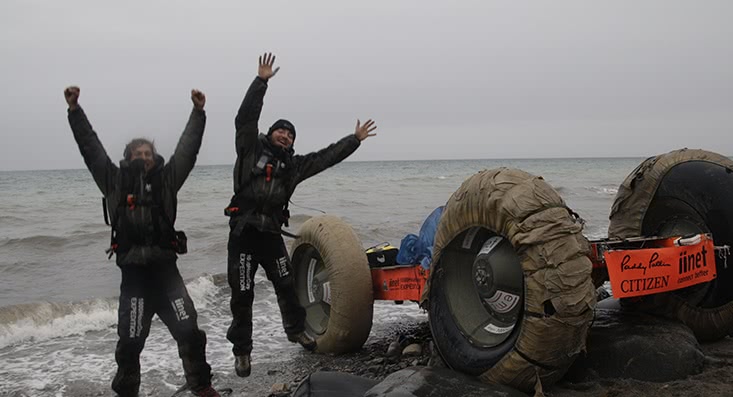Almost a decade in the making, The Crossing is an epic by all accounts. In 2005, Chris Bray and Clark Carter brazenly set out into the icy Arctic wilderness. Two attempts, two homemade kayaks and 100 hours of footage later, the pair became the first to cross the 1000-kilometre-wide Victoria Island. Having already picked up the Audience Award for Best Documentary at last year’s Sydney Film Festival, The Crossing has gained attention in various international film festivals. Clark Carter and Julian Harvey, director and fellow adventurer, spoke of near disasters, never giving up and getting off the beaten track for all the right reasons.
The Crossing is, more than anything, about human experiences in an environment more trying and more ethereal than most. “One of the aims of the film was to get people immersed in the expedition,” says Harvey. “We’re trying to create something which lets you feel what it’s like – the monotony, the pain, the suffering, the joy – all the things that become part of an expedition.” This is not your man-conquers-nature kind of documentary. When first viewing the footage, Harvey saw “a sort of stripping back, learning about the world. I think that’s why adventure’s really good for people. So when I realised that’s what this is about, and not many people do that anymore, it was just fascinating.”
The notion of the lone explorer, battling unknown territory far from civilization, has long been usurped by the tech-savvy adventurer. “That’s an interesting thing within itself”, says Carter, “you go out there in the middle of nowhere and then remain in contact with everyone. It’s kind of this funny oxymoron. So it was nice, we felt very isolated and very remote, but we were also able to share our experience.”
The adventure destination is perhaps equal parts obscure and fascinating. “Victoria Island was kind of hidden in this in-between region,” says Carter. Most adventure-seekers head for the North Pole, but the average person wouldn’t get that far into the freezing north. “Even though it’s a big island, just not that many people go there, so we did find ourselves quite often in places we knew people just hadn’t been before,” says Carter. “You’re so far from anyone that you really could just be on another planet.”
Victoria Island is home to a small menagerie of sub-arctic animals who became unlikely cast members. “We did get footage of the polar bears and the wolves, but a lot of the more dangerous moments you don’t tend to capture on film, you’re just trying not to die,” says Carter, with a laugh. One of Harvey’s favourite moments is when the guys encounter a pack of wolves that were “wandering though camp and almost playing in it. It’s a different side of wolves, one that you don’t see in a David Attenborough BBC doco.” This is a big aspect of the experience that Harvey aspires to capture, “they (Chris and Clark) were just living in amongst it, sort of floating past. You get this real sense of the natural life of these animals, they were just curious, looking at these guys who rocked up for the night with these giant orange kayaks.”
This is perhaps an adventure only two young Aussies would ever attempt. “The idea was quite simple”, says Harvey, “you’re just going from here to here, but there is such a long distance and so many obstacles…” For these adventurers some obstacles just happened to include running from wolves and hiding from polar bears. And what does his Mum think of all this? “It’s been a long and arduous road to get my mum on side, but she loves it.”
The Crossing is in cinemas from Thursday April 24.


































